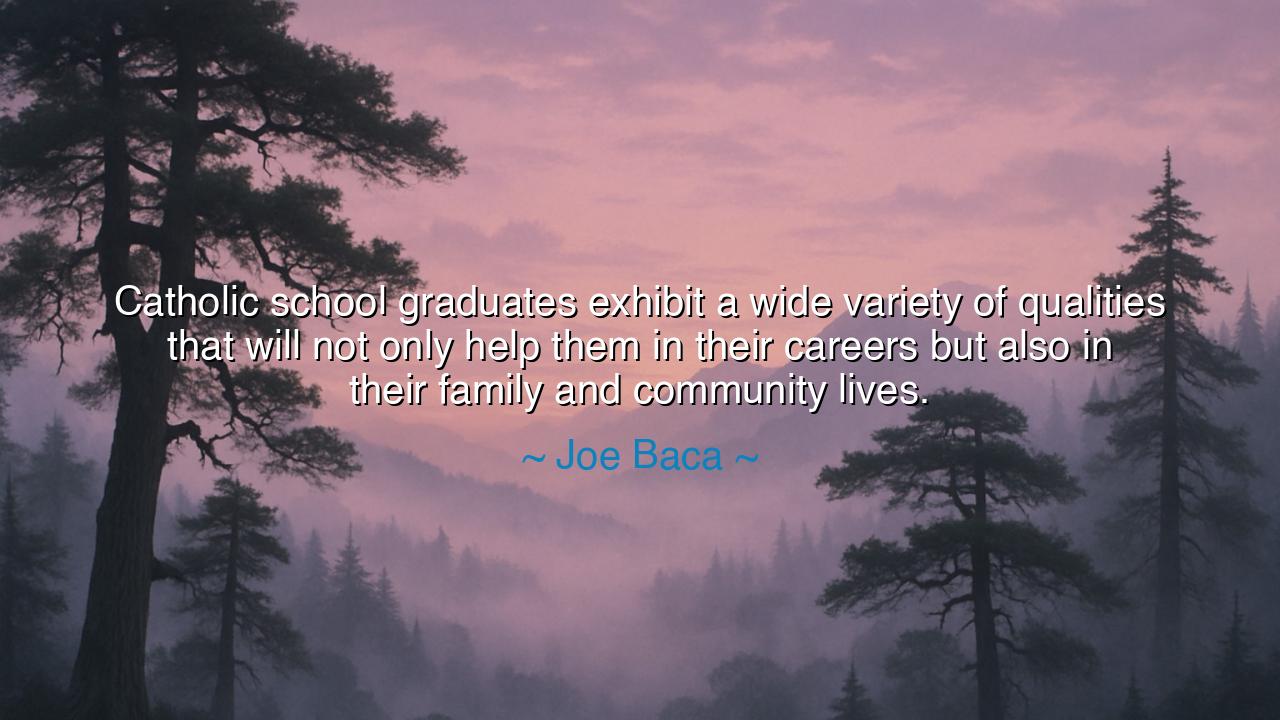
Catholic school graduates exhibit a wide variety of qualities
Catholic school graduates exhibit a wide variety of qualities that will not only help them in their careers but also in their family and community lives.






The words of Joe Baca — “Catholic school graduates exhibit a wide variety of qualities that will not only help them in their careers but also in their family and community lives.” — carry the quiet gravity of ancient truth wrapped in modern simplicity. Beneath this statement lies not mere praise for an institution, but a reflection on the power of moral education — the shaping of the whole person, not just the mind. For what is true learning if it builds knowledge but not virtue? In these words, we hear the echo of the ancients who taught that the education of the heart must walk hand in hand with the education of the intellect, lest wisdom be lost to pride.
To understand Joe Baca’s thought, one must see that he speaks not only of schools, but of a tradition — one rooted in centuries of faith, reflection, and service. The Catholic school is not merely a place of instruction; it is a workshop of the soul. It teaches discipline, humility, and compassion alongside mathematics and literature. It forms the conscience as carefully as it trains the mind. Its aim is not only success in career, but integrity in character. When Baca speaks of graduates who carry qualities into their family and community lives, he reminds us that true education must bear fruit beyond the self — that the light of learning is meant to illumine the world around us.
This idea is as old as civilization itself. The ancient philosophers of Greece, such as Aristotle, taught that the purpose of education was to cultivate virtue — that knowledge without goodness was like a sword without a guide. The monastic schools of the Middle Ages, from which Catholic education grew, carried this flame forward. Within their stone halls, monks and scholars taught not only letters, but life — reverence, order, and service. From their work came not only priests and theologians, but scientists, artists, and thinkers who shaped the course of Western civilization. They believed, as Joe Baca does, that the educated soul must be a moral one — that learning divorced from virtue cannot serve humanity.
Consider the story of St. Thomas More, a man formed by faith and learning. Trained in the spirit of Catholic education, he rose to prominence as a lawyer and statesman in England. Yet when the storm of politics tested his soul, he chose truth over power, conscience over convenience. He said, “I die the king’s good servant, but God’s first.” His courage was not born from ambition, but from formation — from years of being taught that the measure of a person lies not in success, but in principle. This is what Joe Baca means when he speaks of qualities that endure — virtues that anchor a person in family, in work, and in service to others.
In the modern world, where education is often measured by utility — by the salary one earns or the prestige one attains — Baca’s words remind us that the highest purpose of education is to produce goodness. The graduate who walks into the world with skill but without soul is like a craftsman with fine tools but no sense of beauty. Yet the one who leaves school with compassion, courage, and faith carries within them the seed of leadership, the strength to nurture both home and community. The Catholic tradition, with its call to love one’s neighbor and to act justly, seeks to form such people — those who can lift others while climbing themselves.
There is wisdom, too, in Baca’s emphasis on the balance between career, family, and community. The ancients often warned that the pursuit of greatness without harmony leads to ruin. The Stoics taught that true success lies in self-mastery; the early Christians taught that charity is the root of all virtue. The Catholic graduate, in this vision, is one who remembers that achievement is hollow unless it uplifts others. Such balance — between ambition and humility, intellect and faith, service and self — is the foundation upon which enduring societies are built.
So let this teaching be carried forward: seek education not merely for advancement, but for transformation. Learn not only to master the world, but to master yourself. Let your knowledge be tempered by kindness, your ambition guided by conscience, your success measured by the good you do for others. Whether you are raised in a Catholic school or in any place of learning, remember that the truest measure of education is not in what you know, but in who you become.
For as Joe Baca reminds us, the graduate who carries both wisdom and virtue into the world becomes more than a professional — they become a pillar of family, a servant of community, and a light to those who follow. And this, as the ancients would say, is the highest form of victory: not to conquer others, but to illuminate the path of goodness for all.






AAdministratorAdministrator
Welcome, honored guests. Please leave a comment, we will respond soon